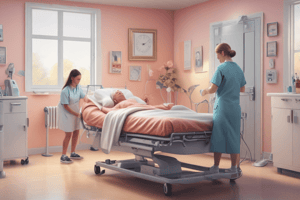Podcast
Questions and Answers
What are good sources of protein?
What are good sources of protein?
- Beans (correct)
- Fruits
- Fish (correct)
- Vegetables
What is the most essential nutrient for life?
What is the most essential nutrient for life?
Water
Fats help the body store energy.
Fats help the body store energy.
True (A)
Without ________, a person can only live a few days.
Without ________, a person can only live a few days.
Which type of diet is recommended for those at risk for heart attacks?
Which type of diet is recommended for those at risk for heart attacks?
What is the recommended fruit choice for most individuals?
What is the recommended fruit choice for most individuals?
What kind of grains are best to consume?
What kind of grains are best to consume?
What should be done before serving meal trays?
What should be done before serving meal trays?
Residents should be sitting upright at a 90-degree angle for eating.
Residents should be sitting upright at a 90-degree angle for eating.
People can become dehydrated by __________.
People can become dehydrated by __________.
What is a symptom of dehydration?
What is a symptom of dehydration?
Which of the following foods is considered high in sodium?
Which of the following foods is considered high in sodium?
Encourage residents to ________.
Encourage residents to ________.
What should the NA ensure regarding the water pitcher and cup?
What should the NA ensure regarding the water pitcher and cup?
What is the purpose of socializing during meals?
What is the purpose of socializing during meals?
What should be reported when there is redness or drainage around the opening?
What should be reported when there is redness or drainage around the opening?
Use _______ devices to assist residents when necessary.
Use _______ devices to assist residents when necessary.
What should be done if a resident bites down on utensils?
What should be done if a resident bites down on utensils?
The sense of thirst increases as a person ages.
The sense of thirst increases as a person ages.
Flashcards
What are proteins?
What are proteins?
Essential for tissue growth and repair, found in foods like fish, meat, beans, soy products, and cheese.
What are fats?
What are fats?
Help store energy and absorb vitamins, classified as monounsaturated, polyunsaturated, and saturated.
Why is water essential?
Why is water essential?
The most vital nutrient for life, making up half to two-thirds of body weight.
What are carbohydrates?
What are carbohydrates?
Signup and view all the flashcards
What are minerals?
What are minerals?
Signup and view all the flashcards
What does MyPlate recommend?
What does MyPlate recommend?
Signup and view all the flashcards
What is a low-fat/low-cholesterol diet?
What is a low-fat/low-cholesterol diet?
Signup and view all the flashcards
What is a vegetarian diet?
What is a vegetarian diet?
Signup and view all the flashcards
What is a low-protein diet?
What is a low-protein diet?
Signup and view all the flashcards
What is a soft diet?
What is a soft diet?
Signup and view all the flashcards
What is a pureed diet?
What is a pureed diet?
Signup and view all the flashcards
What are fluid-restricted diets?
What are fluid-restricted diets?
Signup and view all the flashcards
What are diabetic diets?
What are diabetic diets?
Signup and view all the flashcards
What are the signs of dehydration?
What are the signs of dehydration?
Signup and view all the flashcards
How to assist residents with hydration?
How to assist residents with hydration?
Signup and view all the flashcards
How to create a pleasant mealtime atmosphere?
How to create a pleasant mealtime atmosphere?
Signup and view all the flashcards
What are hand hygiene guidelines for mealtime?
What are hand hygiene guidelines for mealtime?
Signup and view all the flashcards
How to ensure safe positions during mealtime?
How to ensure safe positions during mealtime?
Signup and view all the flashcards
How to assist visually-impaired residents during meals?
How to assist visually-impaired residents during meals?
Signup and view all the flashcards
Study Notes
Nutrition Basics
- Proteins are essential for tissue growth and repair, with main sources including fish, meat, beans, soy products, and cheese.
- Fats aid in energy storage and help the body absorb certain vitamins, classified into monounsaturated, polyunsaturated, and saturated varieties.
- Water is the most vital nutrient for life; a person can only survive a few days without it and constitutes half to two-thirds of body weight.
- Carbohydrates provide fiber and are found in foods such as bread, cereal, and potatoes.
Dietary Considerations
- Minerals like iron and calcium are crucial; most cannot be produced by the body.
- MyPlate guidelines recommend that half of a plate consist of grains and protein, emphasizing whole grains and low-fat dairy options.
- Health diets vary:
- Low-fat/low-cholesterol diet is for heart disease risks, emphasizing skim milk and lean meats.
- Vegetarian diets are chosen for health, ethical, or belief reasons.
- Low-protein diets are suitable for individuals with kidney disease; favored foods include breads and pasta.
- Soft diets include easy-to-chew foods; pureed diets have foods mashed to a thick consistency.
Fluid and Hydration Management
- Fluid-restricted diets prevent heart or kidney damage by limiting fluid intake.
- Diabetic diets may involve carb counting for active control of sugar intake.
- Symptoms of dehydration include dark urine and can occur from excessive vomiting; monitoring is essential to prevent complications such as edema due to fluid overload.
Resident Care Guidelines
- Assist residents with adequate hydration by offering fluids frequently and ensuring easy access to water pitchers.
- Encourage a pleasant mealtime atmosphere: keep noise levels low and promote socialization to enhance appetite and mitigate loneliness.
- Always ensure proper hand hygiene before assisting with meals, and encourage residents to wash their hands before eating.
- Positions should be adjusted for safe eating: residents should sit upright at a 90-degree angle to aid digestion and prevent choking.
Special Assistance Techniques
- For visually-impaired residents, use an imaginary clock to describe food locations.
- Assistive devices can promote independence and make eating easier for residents with difficulties, such as tremors or balance issues.
- Monitor and report any signs of skin irritation or changes around feeding tubes to prevent complications.
- Employ clear verbal and physical cues to support residents during mealtime, encouraging them to chew and swallow effectively.
Studying That Suits You
Use AI to generate personalized quizzes and flashcards to suit your learning preferences.





